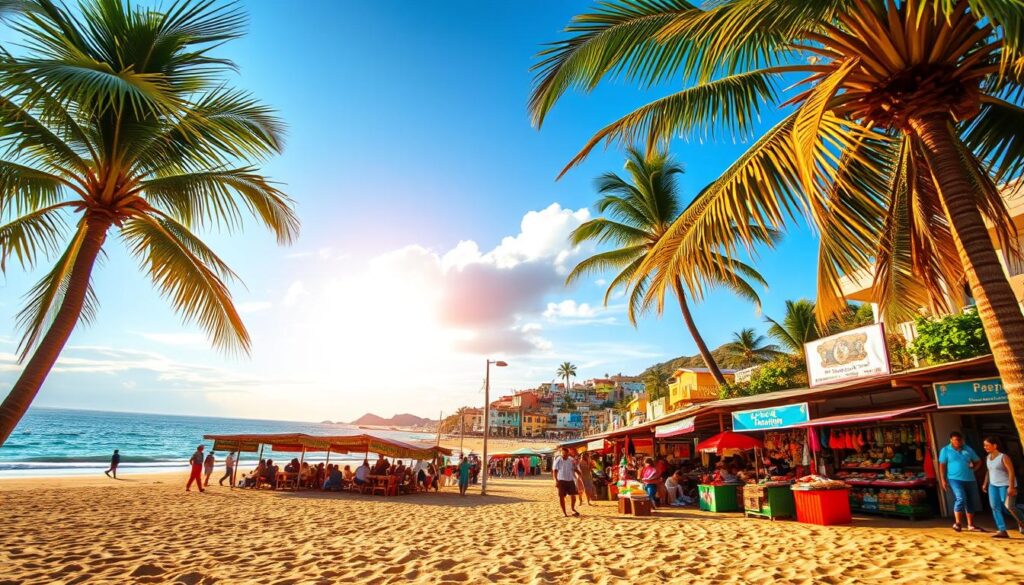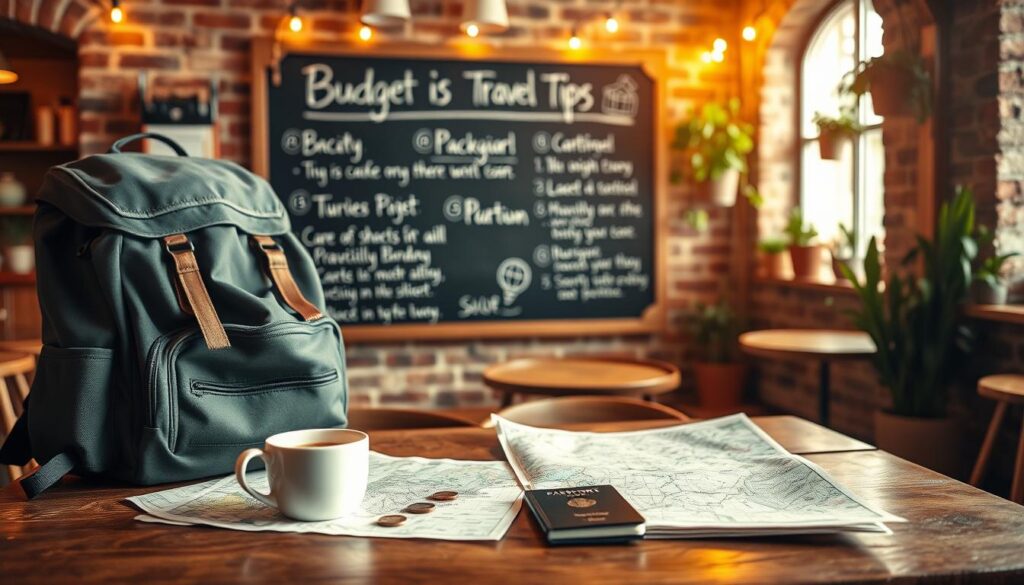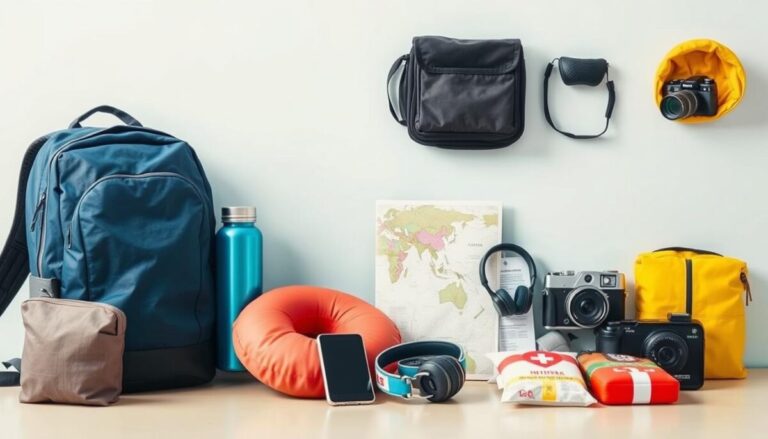
Are you ready to explore the world without breaking the bank? With the right strategies, you can enjoy affordable getaways that are both fun and memorable.
You don’t have to sacrifice comfort for affordability. By planning your trips during off-peak seasons and using smart booking strategies, you can save a lot.
Learn how to use your budget travel tips to explore new places without worrying about money.
Key Takeaways
- Plan your trips during off-peak seasons to save.
- Use smart booking strategies to get the best deals.
- Explore affordable destinations that fit your budget.
- Enjoy local eats and avoid touristy areas to cut costs.
- Research and plan ahead to make the most of your trip.
The Mindset of a Budget Traveler

Budget travel is more than saving money. It’s about enjoying more. When you travel on a budget, you discover new experiences and ways to see the world.
Prioritizing Experiences Over Luxury
At the core of budget travel is valuing experiences over luxury. You can save money on travel by diving into local cultures and trying street food. Exploring off-the-beaten-path areas also cuts costs on tourist traps.
By focusing on experiences, you realize that travel’s true value is in making connections and creating memories. It’s not about how much you spend on hotels or food.
Setting Realistic Financial Expectations
To travel on a budget, setting realistic financial goals is key. Understand the costs of your destination, like transportation, food, and activities. This way, you can make a budget that’s both realistic and doable, helping you save money on travel without feeling limited.
Being honest about what you can afford is important. It helps avoid financial stress and lets you enjoy your trip more.
The Value of Research and Planning
Research and planning are essential for budget travel. By researching your destination, you find affordable places to stay, eat, and play. Planning ahead also lets you snag early bird discounts and deals.
Good planning is not just about saving money. It’s about making your trip better. Knowing what to expect and being ready reduces stress and lets you fully enjoy your budget travel.
Strategic Planning: When and Where to Travel

To find affordable travel, knowing when and where to go is key. Planning ahead helps you save money and enjoy your trip more.
Leveraging Shoulder Seasons for Better Deals
Traveling in the shoulder season can save you a lot. It’s the time between peak and off-peak seasons. You’ll find lower prices and fewer people around.
For example, visiting Europe in April or October is great. You get mild weather and lower prices, without the summer crowds.
Choosing Budget-Friendly Destinations
Picking the right place to visit is important. Some places are cheaper because of lower living costs or better exchange rates. Look for places with rich culture but not high prices.
Places like Thailand and Vietnam are great. They offer tasty street food, stunning views, and history at a low cost, compared to Western Europe or North America.
Planning Around Local Events and Festivals
Local events and festivals can change your travel experience. They might raise prices but also offer unique cultural experiences. Planning around these can make your trip special.
For example, the Carnival in Rio or the Tomatina Festival in Spain are unforgettable. They give you memories you’ll cherish forever.
Domestic Travel Opportunities in the United States
You don’t need to go abroad for a cheap vacation. The U.S. has many places to explore, from national parks to cities. Asheville, North Carolina, and Portland, Oregon, are great for culture and outdoor fun, and they’re often cheaper than international trips.
Exploring the U.S. can save you money. It means avoiding expensive flights and dealing with less currency exchange hassle.
Budget Travel Tips That Actually Work

You don’t have to spend a lot to travel the world. With smart tips, you can enjoy a great trip without breaking the bank. It’s all about making smart choices that save money without sacrificing your travel experience.
Creating a Realistic Travel Budget
To begin, you need to create a realistic travel budget. This budget should cover all your expenses, from getting there to eating and doing things. Start by researching your destination to know what to expect and where you can save.
Use the 50/30/20 rule as a guide. Spend 50% on basics like where you’ll stay and eat, 30% on fun stuff, and 20% on savings or surprises.
Using Apps and Tools to Track Expenses
Using apps and tools to track your expenses is key to staying on budget. Apps like Trail Wallet or Mint let you see your spending in real-time. They help you understand your spending habits and adjust as needed.
These tools also warn you about spending too much. This way, you can stay on track and make the most of your travel money.
Building in Financial Buffers for Emergencies
It’s smart to build a financial buffer into your budget for unexpected costs. Just set aside a bit of your daily budget for emergencies.
This buffer gives you peace of mind. It ensures you’re ready for any surprise that might come up during your trip.
Packing Strategies to Avoid Extra Costs
Smart packing strategies can also save you money. For example, packing light can avoid baggage fees. Bringing a portable charger means you won’t have to pay for charging services.
Also, packing clothes and essentials that do more than one thing can cut down on buying things while you’re away. This saves you even more money.
Finding Affordable Flights: Strategies That Work
Learning how to find cheap airfare can change your travel budget. Whether you’re a seasoned traveler or new to trips, finding affordable flights is key to saving money.
Best Times to Book Air Travel
Timing is key when booking flights. Research shows booking at the right time can cut costs. For domestic flights, book 2-3 months in advance. For international flights, book 6-8 months before your trip.
Also, flying on off-peak days like Tuesdays, Wednesdays, and Saturdays can save you money. These days are cheaper than Mondays, Fridays, and Sundays, when business travelers often fly.
Flight Comparison Tools and Alerts
Using flight comparison tools can be a big help. Sites like Google Flights, Skyscanner, and Kayak let you compare prices across airlines. This helps you find the best deals.
- Google Flights: Offers a price trend feature that shows whether prices are likely to rise or fall.
- Skyscanner: Includes a “Everywhere” search feature that helps you find the cheapest destinations.
- Kayak: Provides price forecasts to help you decide when to book.
Alternative Airports and Routes
Being flexible with your travel plans can save you money. Look into alternative airports or routes for cheaper flights. For example, flying into a nearby city or using a different airport for departure can save you cash.
Also, flying with a layover can sometimes be cheaper than a direct flight. It may take longer, but it can be a cost-effective option.
Leveraging Airline Miles and Credit Card Points
If you travel often or have a travel credit card, using airline miles and credit card points can save you money. Look into loyalty programs and credit card rewards that offer travel benefits.
- Sign up for airline loyalty programs: Earn miles that can be redeemed for flights.
- Use travel credit cards: Earn points or miles on your purchases that can be transferred to airline loyalty programs.
- Look for credit card sign-up bonuses: Many cards offer substantial bonuses that can cover a significant portion of your flight costs.
By using these strategies, you can cut down your flight costs. This lets you spend more on enjoying your trip.
Budget Accommodation Options Beyond Hotels
Traveling on a budget doesn’t mean you have to stay in hotels. There are many other options that can save you money. Each one has its own benefits and ways to cut costs.
Hostels, Guesthouses, and Budget Hotels
Hostels are a favorite among budget travelers. They offer dorms and sometimes private rooms. You can meet other travelers and enjoy shared spaces like kitchens and lounges.
Guesthouses feel like home, thanks to their family-run vibe. Budget hotels are more traditional but cheaper, with basic amenities.
Comparison of Budget Accommodations:
| Accommodation Type | Average Cost per Night | Amenities |
|---|---|---|
| Hostel Dorm | $15-$30 | Shared kitchen, lounge, Wi-Fi |
| Guesthouse | $40-$80 | Private bathroom, breakfast, Wi-Fi |
| Budget Hotel | $60-$120 | Private bathroom, TV, Wi-Fi, sometimes breakfast |
Vacation Rentals and Home Exchanges
Vacation rentals give you a whole home or apartment. They’re great for groups or long stays, as they offer more space and the chance to cook your own meals. Home exchanges let you swap homes with someone else for a set time.
House Sitting and Couchsurfing
House sitting means taking care of a home while the owners are away. It’s a way to live like a local. Couchsurfing lets you stay with locals for free, but it’s based on respect and sometimes requires giving back.
Campus Housing During Summer Breaks
Staying in campus housing during summer breaks is a cheap and safe option. You get to use university facilities like pools and gyms. It’s a unique way to see student life and local culture.
Exploring these budget options can make your trip cheaper and more fun. It’s all about finding the right fit for your travel style and budget.
Transportation Hacks While at Your Destination
Traveling on a budget? Using the right transportation at your destination is key. Choose the most affordable options to cut down your travel costs.
Public Transit Passes and City Cards
Public transit is a great way to get around a city. Most rides cost under $3. All-day passes in cities like Chicago, Madrid, and Bangkok are just $10 to $15. City cards offer transit, attraction discounts, and more, making them a smart choice for travelers.
Benefits of Public Transit:
- Cost-effective
- Environmentally friendly
- Opportunity to interact with locals
Ridesharing vs. Car Rentals vs. Public Transport
Choosing how to get around involves weighing ridesharing, car rentals, and public transport. Ridesharing is convenient but can be pricey. Car rentals offer flexibility but come with costs. Public transport is often the most affordable and efficient.
| Transportation Method | Cost | Convenience |
|---|---|---|
| Ridesharing | $5-$10 per ride | High |
| Car Rentals | $40-$100 per day | Medium |
| Public Transport | $1-$3 per ride or $10-$15 for an all-day pass | High |
Walking Tours and Bike Rentals
Exploring on foot or by bike is cost-effective and immersive. Many cities offer low-cost guided walking tours. Bike rentals start at $10 per day.
Tips for Walking Tours:
- Look for free or low-cost guided tours
- Wear comfortable shoes
- Bring a map or use a GPS device
Group Transportation Options
For longer trips or group travel, consider shuttle buses or private car services. They’re more affordable than individual ridesharing and convenient for groups.
By using these transportation hacks, you can save money and enjoy a more authentic trip. The right choices can make a big difference, whether in a bustling city or a new region.
Eating Well Without Breaking the Bank
You can enjoy the flavors of your destination without spending too much. Eating well while traveling is about more than just food. It’s about experiencing the local culture. With a few smart choices, you can enjoy local cuisine without spending a lot.
Self-Catering and Grocery Shopping
Self-catering is a great way to save on food while traveling. If you can, cook some meals yourself. Visit local grocery stores or markets for fresh ingredients. This is not only cheaper but also lets you meet locals and learn about their food habits.
- Look for local grocery stores or supermarkets near your accommodation.
- Explore local markets for fresh and often exotic produce.
- Prepare simple meals or snacks to keep you going throughout the day.
Finding Authentic, Affordable Local Restaurants
Eating out doesn’t have to be pricey. Instead of going to touristy spots, find places where locals eat. These spots usually offer authentic, tasty meals at lower prices.
- Ask locals or your accommodation provider for recommendations.
- Look for restaurants that are busy with locals.
- Try traditional dishes that are often more affordable and flavorful.
Street Food Safety and Recommendations
Street food is a big part of many cultures and can be tasty and cheap. But, it’s important to make sure it’s safe to eat.
Tips for enjoying street food safely:
- Choose vendors that are popular with locals.
- Opt for food that is cooked in front of you.
- Avoid raw or undercooked meat, seafood, or eggs.
Water and Beverage Savings
It’s important to stay hydrated, but buying bottled water or fancy drinks can be costly. Here are some tips to save on drinks:
- Carry a refillable water bottle.
- Look for free water fountains or tap water where available.
- Avoid buying expensive coffee or juice; instead, opt for local, affordable alternatives.
By being mindful of your food and drink choices, you can enjoy your trip without overspending. The secret to affordable travel is planning and making smart choices.
Free and Low-Cost Activities and Attractions
Exploring a new city doesn’t have to cost a lot. There are many free and low-cost activities to enjoy. You can dive into local culture, enjoy the outdoors, or see the city’s unique character.
Museums with Free Admission Days
Many museums offer free entry on certain days. For example, some famous museums are free on specific days. This lets you see art, history, and science without spending a lot.
To find these deals, research the museums you want to visit. Look for free admission days on their websites or local tourism sites.
| Museum | Free Admission Day | Location |
|---|---|---|
| The Metropolitan Museum of Art | First Saturday of every month | New York City, USA |
| National Gallery of Art | Every day | Washington, D.C., USA |
| Chicago Art Institute | Last Wednesday of every month | Chicago, USA |
Public Parks, Beaches, and Natural Attractions
Public parks, beaches, and natural spots are great for free fun. You can relax, enjoy the outdoors, and see the local views. From famous city parks to hidden beaches, there’s beauty to discover.
Some cities also have free outdoor events and concerts. You can pack a picnic, go for a hike, or just enjoy the views in these beautiful places.
Self-Guided Walking Tours
Self-guided walking tours let you explore at your own pace. You can make your own route or follow a guide. Many cities offer free walking tour guides online or through apps.
These tours can take you to historic districts, famous landmarks, and cultural neighborhoods. You can also find hidden gems and local favorites that tourists often miss.
Community Events and Festivals
Community events and festivals let you experience local culture and spirit. Many cities have free or low-cost events all year. You can enjoy outdoor concerts and festivals, food markets and cultural celebrations.
To find out what’s happening, check local event calendars or ask your hotel or local tourism office. You can enjoy live music, local cuisine, and community activities while experiencing the local culture.
By using these free and low-cost activities, you can have a great travel experience without spending too much. With a little planning, you can enjoy everything your destination offers while staying within your budget.
Smart Shopping and Souvenir Strategies
Exploring new places can be fun and budget-friendly. Smart shopping means more than just finding cheap items. It’s about making choices that make your trip better.
Avoiding Tourist Traps and Overpriced Areas
Steering clear of tourist traps and pricey spots is smart. These areas often charge high prices to tourists. Instead, explore local markets and neighborhoods for better deals and authentic goods.
Tip: Ask locals for shopping tips. They know the best, affordable spots with unique finds.
Negotiating at Markets and Shops
Haggling is common in many markets. It’s a way to save money. Start with a lower offer and work up to a fair price.
“The art of bargaining is not just about getting a good deal; it’s about building a connection with the seller.”
Meaningful Souvenirs That Don’t Cost a Fortune
The best souvenirs are personal and affordable. Look for items that show off local culture or are made by locals. Sometimes, the best souvenirs are memories, not things.
Remember: “The best souvenirs are memories, which don’t cost a thing.” Seek out experiences and memories over expensive items.
Tax Refunds for International Shoppers
Shopping abroad? You might get tax refunds on your buys. Many countries offer VAT refunds for tourists. Look for stores that offer this and follow the refund process.
Using these smart shopping tips can make your travels budget-friendly. Whether it’s finding affordable souvenirs or enjoying shopping, being informed is key to a great trip.
Technology Tools for the Budget Traveler
Budget travel is now easier thanks to new technology tools. Apps and digital solutions help cut costs and improve your travel. You can save money and have a better trip.
Essential Money-Saving Apps
Many apps help track expenses, find cheap places to stay, and explore new places. For example, Trail Wallet lets you watch your daily spending. Rome2Rio gives you info on how to get from one place to another.
- Budgeting Apps: Tools like Trail Wallet help you stay on top of your expenses.
- Travel Guides: Apps such as Rome2Rio offer valuable insights into transportation and travel planning.
Offline Maps and Translation Tools
Traveling without internet can be tough. Maps.me provides offline maps so you can find your way. Google Translate helps you talk to locals and read signs.
- Download offline maps with Maps.me to avoid data roaming charges.
- Use Google Translate to communicate with locals and read signs.
Communication Options Without Roaming Charges
It’s expensive to stay in touch without the right tools. Apps like WhatsApp and Signal let you message and call for free over Wi-Fi. This means you don’t need to use roaming services.
- Use messaging apps for communication over Wi-Fi.
- Consider purchasing a local SIM card or portable Wi-Fi hotspot for data access.
Digital Banking and Money Transfer Solutions
Managing money abroad is easier with digital banking and money transfer apps. TransferWise offers better exchange rates and lower fees than banks.
Using these technology tools makes budget travel more efficient and fun. You can save money and have a great trip.
Conclusion: Making Memories Without Breaking the Bank
With a little planning, you can find affordable adventures that don’t feel cheap. Traveling during shoulder seasons and looking for flight deals can help stretch your budget. This makes your journey more enriching.
Budget travel is about making smart choices. This includes picking affordable places to stay, using public transport, and trying local food. By using these tips, you can explore new places without spending too much.
Now, it’s time to put these strategies into action. Start planning your next adventure. With the right mindset and a few simple tools, you can make unforgettable memories while staying within your budget.
FAQ
What is the best way to start planning a budget trip?
How can I save money on flights?
What are some budget accommodation options beyond traditional hotels?
How can I eat well on a budget while traveling?
What are some free or low-cost activities I can enjoy while traveling?
How can I save money on transportation at my destination?
What are some smart shopping strategies for budget travelers?
How can technology aid in budget travel?
What are some tips for creating a realistic travel budget?
How can I make the most of my budget travel experience?
Share :
You Might Also Like







